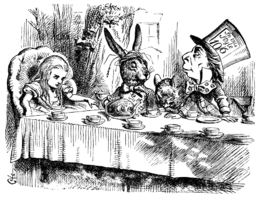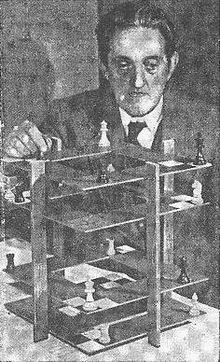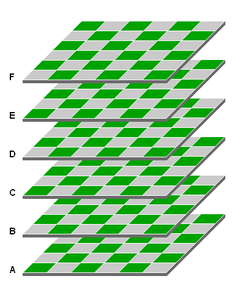- V. R. Parton
-
Vernon Rylands Parton (1897–1974) was an English chess enthusiast and prolific chess variant inventor, his most renowned variant being Alice Chess.[1] Many of Parton's variants were inspired by the fictional characters and stories in the works of Lewis Carroll. Parton's formal education background, like Lewis Carroll's, was in mathematics.[2]
I have distinct memories of sitting on his knee and listening to these [Lewis Carroll] stories, and not a book in sight.
He had a favorite uncle, who was blind, and Vern was content to escort him around.
Vern never wanted to benefit financially from his work, but asked only for a contribution to charities for the blind.— Peter Parton[2]
Parton wrote a series of nine monographs published from 1961 to 1974 detailing his inventions. Parton died at age 77 on 31 December 1974. The same year, variant inventor Philip M. Cohen created the variant Parton Chess in his honor.
Contents
Cubic Chess
In this 6×6×6 3D variant by Parton, boards are denoted A (bottom level) through F (top level). Each side has six pieces: king (K), queen (Q), bishop (B), unicorn (U), knight (N), and rook (R); and twelve pawns.[3]
Game rules
Pieces move the same as in Raumschach, except that pawns move and capture one step forward (either orthogonally, diagonally, or triagonally), but not directly upward or downward. As in chess and Raumschach, the objective is checkmate.
- White's starting position: KAa1, QAb1, BAc1, UAd1, NAe1, RAf1; pawns on Aa2–f2 and Ba1–f1
- Black's starting position: KAf6, QAe6, BAd6, UAc6, NAb6, RAa6; pawns on Aa5–f5 and Ba6–f6
Variation
Parton made a variation of Cubic Chess for the same gameboard: In Compulsion Cubic Chess, capture is compulsory, there are no checks, and the object is capture of the opposing king.
Mad Threeparty Chess
This variant is for three[4] players on a 10×10 board. Each player has a standard set of pieces in his own color, including an extra king,[5] but no pawns.
 The Mad Hatter's tea party; illustration by Sir John Tenniel
The Mad Hatter's tea party; illustration by Sir John Tenniel
Rules
The board starts empty. Players take turns, in clockwise rotation around the board, placing one of their pieces on any vacant square. Kings are placed last, but must not be placed in check.
The two kings of each player are marked differently. (For example, of a player's two kings, one might be marked with a star.) Each player attacks the marked king of the opponent to his left, and the unmarked king of the opponent to his right. It is not permitted to check the opponents' other kings.
The first player to checkmate a king wins the game.
Chess variants
- Checkers Chess (1950s)
- Decimal Four-Handed Chess (1950s)
- Idle Kings' Chess (1950s)
- Nightrider Chess (1950s)
- Scaci Partonici (1950s)
- Rettah Chess (1952)
- Decimal Rettah Chess (1952)
- Double Rettah Chess (1952)
- Tweedle Chess (or Twin Orthodox Chess) (1952)
- Alice Chess (1953)
- Kinglet Chess (or Imperial Fiddlesticks) (1953)
- Neutral King Chess (1953)
- No-Retreat Chess (1954), co-inventor J. Boyer
- Black & White Chess (1955)
- Degraded Chess (1958)
- Contramatic Chess (1961)
- Complete Contramatic Chess (1961)
- Damate (1961)
- Dunce's Chess (1961)
- Gryphon Chess (or Complicacious Chess) (1961)
- Jabberwocky (1961)
- Knightmare Chess (1961)
- Linear Chess (1961)
- Racing Kings (1961)
- Scacia (1961)
- Royal Scaci Partonici (1961)
- Simpleton Chess (1961)
- Twin Chess (1961)
- Unirexal Chess (1961)
- Chimaera Chess (1969)
- Mock Chess (1969)
- Ambi-Chess (1970)
- Butters (1970)
- Best Decimal Butter (1970)
- Blot-Straight Chess (1970)
- Capricorn Chess (1970)
- Centaur Royal (1970)
- Cheshire Cat Chess (1970)
- Co-Regal Chess (1970)
- Cubic Chess (1970)
- Demigorgon Chess (1970)
- Dodo Chess (1970)
- Ecila (1970)
- Gorgona Chess (1970)
- Identific (1970)
- Looking-Glass Chess (1970)
- Mad Threeparty Chess (1970)
- Meddlers' Chess (1970)
- Semi-Queen Chess (1970)
- Sphinx Chess (1970)
- Timur's Cubic Chess (1970)
- Wyvern Chess (1970)
- Circean (1971)
- Dabbabante Chess (1971)
- Decimal Oriental Chess (1971)
- Imitante Queen Chess (1971)
- Synchronistic Chess (1971)
- Royal Fury (1972)
- 2000 A.D. (1972)
- Gorgon Chess (1973)
- Megasaur Chess (1973)
- Mimotaur Chess (1973)
- Rangers Chess (1973)
- Triscacia (1974)
Checkers variants
- Good-for-Nothings
- Dragon
- Kinger, Simple Kinger, and Grand Kinger
Monographs (with section headings)
Curiouser and Curiouser, (1961), 31 pp.
- Scacetic
- The First Lesson in Chess
- Dunce's Chess in Three Grades
- Imperial Fiddlesticks
- The Queen's Relations
- The Dodo's Chess
- Rettah
- Simpletonry
- Alician
- The Black King's Complaint
- Tweedledee and Tweedledum
- Mock Turtle's Pseudomprphy
- Damification
- A New Pudding
- Podospherism
- Contramatic
- The Rules According to the March Hare
- Knightmares
- Gryphon's Fancy and Fun
- The Realm of Circum Morus
- The Caterpillar's Idea of C.C.C.
Challenge and Delight of Chessical and Decimal, (1970), 14 pp.
Chesshire-Cat-Playeth Looking-Glass Chessys, (1970), 27 pp.- The Queen of Hearts' Chess
- Capricorn Chess
- The Black King's Complaint
- The Rules According to the March Hare
- Identific
- Synchronistic Chess
- Jabberwocky Chess
- Dodo Chess
- The Chesshire Cat's Grin
- Scaci Partonici
- A Chess Reflection
- Demigorgons
- The Mad Tea Party
- Knightmares
- Scaci Partonici
Chessical Cubism or Chess in Space, (1971), 16 pp.
- Cubic Chess
- Tamerlane Variation of Cubic Chess
- Sphinxian Chess
- The Compulsion Sphinx Chess Variations
- Ecila Chess
100 Squares for Chess + Damante, (1972), 16 pp.
- Capablancan Chess
- Decimal Falcon-Hunter (Schulz Chess)
- Half-Queen's Chess
- Decimal Oriental CHess
- Decimal Imitante Q Chess
- Centaur Royal
- Damate Game
- Damatic Chess
- Decimal Duffer's Chess
- Wyvern Chess
- Dabbabante Chess
- Decimal Butter
- Decimal Obstacles Chess
- Chimaera
- Gorgona
- Circean
- Ambi-Chess
- Decimal Scaci Partonici
My Game for 2000 A.D. and After, (1972), 12 pp.
Enduring Spirit of Dasapada, (1973), 19 pp.- Dasapada
Idea for a Personal Game, (1973), 12 pp.
- The Basis of Pawn Partonici
- The Idea of Scaci Partonici
Chessery for Duffer and Master, (1974), 23 pp.
- Chessery for Duffer and Master
- The Game of Rettah Chess
- Semi-Queen Chess
- The Diversion of Zerta
- Meddlers Chess Game
- The Alice Chess Game
- The Idea of Gryphon Chess
- Royal Fury
See also
- Chess variants
- Three-dimensional chess
Notes
- ^ Pritchard (1994), p. 3
- ^ a b AG8 (2001), p. 9
- ^ Pritchard (1994), p. 77
- ^ "What are you threee doing?" asked Alice. "We're going to have a Mad Three party" explained the Mad Hatter. Alice thought he must have meant "tea party". "Can I join you please in this party?" she asked politely, and with much curiousity over this painting with jam. "No, you can't" said the March Hare rather impolitely. "If you join, then it would be a Four party instead." Chesshire-Cat-Playeth Looking-Glass Chessys, Parton (1970), p. 6
- ^ "Each player has two Kings!" replied the Hatter very crossly at Alice's ignorance in this matter. "It is home-made plain cake commonsense. One of your opponents attacks one of your kings and the other attacks the other. That is quite easy to understand. If you had only a single king it would get too complicated when both of your opponents attacked the same king." He added with a glare of annoyance at Alice's obvious doubt about that point. "If they had only one teapot they would have to halve it, and what use is half a teapot? You seem as stupid as the Dormouse!" Chesshire-Cat-Playeth Looking-Glass Chessys, Parton (1970), p. 7
References
- Pritchard, D. B. (1994), The Encyclopedia of Chess Variants, Games & Puzzles Publications, ISBN 0-9524142-0-1
- Peter Parton, "Reflections on Vernon Rylands Parton", Abstract Games (Issue 8 Winter 2001), Carpe Diem Publishing, ISSN 1492-0492
External links
- The Chess Variant Pages Vernon Rylands Parton (1897–1974)
- BrainKing.com play Racing Kings online
Categories:- 1897 births
- 1974 deaths
- British chess writers
- Chess biographies
- Chess variants
Wikimedia Foundation. 2010.


